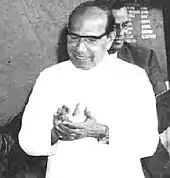Dharmaraja College
Dharmaraja College (Sinhala: ධර්මරාජ විද්යාලය), founded in 1887, is a boys' school in Kandy, Sri Lanka.[1][2][3][4] It is a Buddhist school with around 220 teaching staff and around 4,200+ students.[5] The school has many notable alumni (a.k.a. Rajans) including William Gopallawa, A. E. Goonesinha, T.B Kehelgamuwa, Chamara Kapugedera and others.
Dharmaraja College
| |
|---|---|
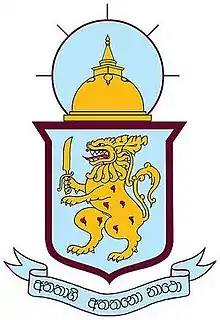 | |
| Location | |
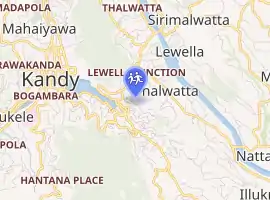
| |
| Coordinates | 7°17′21.69″N 80°38′58.83″E |
| Information | |
| Type | National |
| Motto | Pali: අත්තාහි අත්තනො නාථො Aththāhi Aththano Natho (Oneself is the refuge for one) (Buddhist quote from the Dhammapada) |
| Religious affiliation(s) | Buddhist |
| Established | 30 June 1887 |
| Founder | Col. Henry Steel Olcott |
| Principal | W. M. D. T. P. Wanasinghe |
| Staff | 300+ |
| Grades | Grade 1 – 13 |
| Gender | Boys |
| Age | 6 to 19 |
| Enrollment | 5,000+ |
| Colour(s) | Maroon and Light Blue |
| Alumni | Old Rajans |
| Website | dharmaraja |
A land area of 54 acres (220,000 m2) is owned by the school spreading over half of the Dharmaraja hill.[6] Dharmaraja has one of the oldest scout troops in the world, the 1st Kandy Dharmaraja Scout Group, which was established in 1913.[7][8][9] It is one of the first Sri Lankan schools to start playing cricket.[5][10] It has consistently ranked among the first two boys schools in Sri Lanka in the preference rankings based on year 5 scholarship examinees' demand.[11][12][13]
History
Background and initiation
Dharmaraja College, Kandy is one of the premier Buddhist schools in the country and is named after the Buddha.[14]
Dharmaraja College, as well as the other Buddhist Schools in Sri Lanka, owes its existence to Col Henry Steel Olcott, philanthropist and the founder of the Buddhist Theosophical Society.[15] Having read a printed version of the Panadura Vaadaya of 1873, a public debate between Buddhist and Christian representatives on the correctness of each belief, Col Olcott was really impressed of the teachings in Theravada Buddhism, which were in line with his vision as a theosophist.[16] It resulted in him arriving in Sri Lanka to study more on Buddhism, and starting a branch of the Theosophical Society, first in Colombo and then in Kandy and Galle. He was ably supported by the Venerable Migettuwatte Gunananda Thera – hero of the 'Panadura Vadaya', the Venerable Hikkaduwe Sri Sumangala Thera, the Venerable Dodanduwe Piyarathana Thero, the Venerable Walane Sri Siddhartha Thero and the Venerable Ratmalane Dhammaloka Thero, along with Anagarika Dharmapala, Walisinghe Harischandra, and Don Agaris Divakara Mohottige, Mudaliyar of Central Province. Mudaliyar Agaris was a popular and respected man throughout Kandy Province and had been given the title in 1878 after his father, Don Alexander-James Divakara Mohottige had died.[17]

With Sir Olcott's initiative and guidance, the theosophists identified that a major factor for the decline of Sinhalese Buddhists was the lack of proper education facilities, and the best solution was to make available educational institutes with a solid Buddhist religious background. It was under this theory that foundations were laid to the beginning of the "Buddhist Schools" in Sri Lanka, which include the likes of Dharmaraja College, Ananda College, Maliyadeva College & Mahinda College. In 1887 Sir Olcott visited Kandy and expressed his wish to start an English-medium Buddhist School with the help of Sumangala Thero and the Mudaliyar of Kandy at that time; D.M Agaris.[18] Several Kandyan nobles were very supportive of the idea, and it was decided that the plot of land in front of the Old Palace, adjoining the Natha Devalaya was the best for building the school. But there was an obstacle in that the plot was covered by a Bo tree, held sacred by the Buddhists, which had to be felled for putting up a school building. The British Administration opposed the felling citing that it would be an action against Buddhism. Wadugodapitiya Punchirala Korale, felled and removed the tree in one night, and levelled up the plot for the building.
It was under this pretext that in the morning of Thursday, 30 June 1887, Dharmaraja College, under the name of Kandy Buddhist High School, was opened. This occasion was graced by Sir Olcott, Mudaliyar Divakara Mohottige and several Kandyan nobles including Dullawe Adhikaram, Wadugodapitiya Punchirala Korale, T.B. Panabokke and A.D.J. Gunawardena.[19]
Andiris de Silva was the first principal. He was the only teacher of the school at that time, which had enrolled 12 students.[20] The number of students reached the 50s and the staff increased to three under Andiris de Silva, who was an efficient leader and an accomplished teacher. Many of the local nobles supported Mudaliyar Mohottige and the school by enrolling their children in, having faith in the staff and headmaster.
Initial development
However, by 1890, the necessity of a more qualified principal emerged and appointed Sir D.B. Jayatilaka as principal.[21] The school had around 80 students by then, and Sir Jayathilake's popularity as a leader and his multi-disciplinary fluency and knowledge boosted enrolments as well as the quality of the school. The foundations of transforming Dharmaraja from a mere educational establishment to one of the best schools in Sri Lanka were laid by Sir Jayathilake. Sir Jayathilake was appointed the deputy principal of Ananda College in 1898, and later went on to become the Governor of Ceylon.
H. Banbury succeeded Sir Jayathilake as principal and he brought forth a campaign to raise funds for a permanent school building, travelling even in remote villages collecting donations. He used the money to build a single storied building near the city premises of the school, which was later named the 'Banbury Building' in his honour. One of the most notable events during his time was officially changing the name of the school to Dharmaraja College. Banbury left to India in 1899 to further pursue his studies.
Wilton Hack took over from Banbury, and took over the challenge of developing the school's resources.
Later in 1899, following the retirement of Hack, C.S. Rajaratnam was appointed as principal. Though he himself was not a Buddhist, he was an acclaimed scholar and continued to guide the school along Buddhist principles and attitudes, while giving more emphasis to improve the standard of the education. He won high acclaim from the Educational authorities.
Golden age
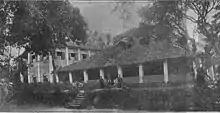
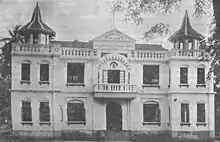
Dharmaraja's golden age began with the appointment of K.F. Billimoria as principal in 1902. Billimoria gave priority to shaping Dharmaraja into a strong institution which could ably compete with the other Missionary Schools at that time. They recruited many able educators as dedicated as them towards heightening the standards of Dharmaraja, and also identified the need of developing the physical resources to match the educational achievements. The founder of the Scout Movement, Lord Baden Powell visited the 'Lake View Park International Scout Centre' of Dharmaraja College twice during this period. It is a unique distinction held by any Sri Lankan school. In 1915 a two-story building completed at the city premises, which later was named in honour of Billimoria. By 1922 Billimoria had raised enough funds to purchase the 'Lake View Estate', a 37-acre (150,000 m2) land overlooking the Kandy Lake, and built the A and B wings of the College Hostel in 1923. The actual hostel began at the Principal's quarters in 1921. There were several incidents of high social and literal importance occurred around Dharmaraja College during this period. Once, a Nobel Laureate in Literature, the great Indian poet Rabindranath Tagore did a dance recital at the Principal's bungalow when he visited the school in the 1920s. And the English poet D. H. Lawrence spent a holiday at Ardnaree, the college Principal's bungalow, in 1922.
The College Scout Group began in 1914,[22] under the patronage of De Saram Brothers and many sports and other extra-curricular activities were encouraged. The '1st Kandy Dharmaraja Scout Group' won the coveted "King's Flag" for three consecutive years from 1917 to 1919. This flag was traditionally awarded to the troop in any of the British colonies that had the largest number of King's Scouts. This is an unprecedented record held by any of the Sri Lankan schools even today. The Cricket Big-Match between Dharmaraja and Kingswood also began in this time.[23] Several world-renowned figures visited Dharmaraja during his office, including Mahatma Gandhi, Lord Baden Powell and D. H. Lawrence. Billimoria served 30 years as principal. He was forced to retire in 1932, which led to the beginning of another important chapter of Dharmaraja History.[24]
P. de S. Kularatne, who had served as the principal at Ananda College, took over duties from Billimoria in 1932 and continued the work. However, Dharmaraja was facing a financial crisis when Kularatne assumed duties, and even the Lake View premise was under threat of being sold. But Kularatne, was able to save the land and secure a home for Dharmaraja, for centuries to come. He restored the Hostel and transformed the Principal's quarters at the city premises to classrooms and a laboratory complex, and Dharmaraja started teaching science subjects in 1933. The first academic buildings in Lake View were built around this time and a part of the students were taken there. The roads and other facilities were also developed so that Lake View transformed from a shrubbery into a property any school would be proud to own. Cadetting in Dharmaraja also began during Kularatne's office and so did many other sports including Tennis, Swimming etc. In 1935 Dharmaraja was visited by four distinguished visitors from India; Rabindranath Tagore, Nandalal Bose, Uday Shankar and Kalki Krishnamurthy.
Beginning of second fifty years as leading school
In 1936 Kularatne was re-appointed as the principal of Ananda, and L.H. Mettananda, who was Ananda's principal at that time, was appointed principal of Dharmaraja. Mettananda identified the necessity of more buildings for the college and set off to build two two-storey buildings at the Lake View premises. It was funded using proceedings of the Golden Jubilee Carnival in 1937 and other fund-raising projects. Dharmaraja started its Advanced Level classes in 1940, and around this time the Secondary Section of the college was moved to Lake View, leaving only the Primary Section at the original premises. Mettananda served Dharmaraja for nearly ten years, and those would be put as an exceptionally important chapter of the college history. In 1946 he was appointed principal back at Ananda, but his service to Dharmaraja would be remembered for years to come, especially with the Mettananda building which now houses the College Offices and the Library.[25]
S.A. Wijayathilake was appointed principal of Dharmaraja in November 1945, the same year that free education was established in Sri Lanka. Wijayathilake faced the challenging task of maintaining the momentum set by Mettananda and Kularatne.[26] He added several more buildings to the school and also developed the laboratories and the library. Wijayathilake, who was a scholar of Buddhist studies and Classical Languages, emphasised on developing the literary activities of the students. Academics saw marked progress within this time, and Wijayathilake's vision and actions assured Dharmaraja held its place as one of the best schools in the country.
Wijayathilake retired in early 1955 and was replaced by Charles Godage, who was also a patron of Arts and an acclaimed poet and writer. He identified the constant need of physical resources for the college to function smoothly, and started the Dharmaraja Development Society in 1955. Dharmaraja College had become widely popular in the country by this time. Notably, S.W.R.D. Bandaranaike started off his victorious campaign for the Parliamentary election of 1956, by an alms giving held at the Dharmaraja Primary School hall, which was known as a "Jayabima".[27] In 1957, the "Kandy Education Front", which led the movement of persuading the Ceylonese government to take over assisted schools around the country, was established at the Dharmaraja Primary School hall under the Chairmanship of Sir Bennet Soysa, a distinguished Old Rajan.[28] By 1959, the end of Godage's office, the number of students had risen from 842 to 1276. This meant many more buildings, lab equipment and resources were necessary. Godage, along with the Development Society, added several more classrooms and laboratories, and also repaired many others. Godage, like his predecessors, gave priority to maintain a high standard in academics, and Dharmaraja's fame only grew. Godage later left for England in 1959 for further pursuing his studies.
Becoming public school and further development
D.B. Thewarapperuma took over the duties from Godage, and continued the progress Dharmaraja had achieved during Godage's office. The academic results and performance in sports saw improved during this time, and in 1960 Dharmaraja, along with Ananda, was taken over by the Government, which was a result of strong campaign led by Thewarapperuma and others. This meant that further development and improvement of the school's resources could now be done without the cost burdening the school board. Thewarapperuma retired from his post in 1961.
Colonel E.A. Perusinghe took office as principal in 1961, and this period showed a marked improvement in the number of students and the number of staff members. Examination results became very satisfactory with large numbers of students being selected to universities, and Col. Perusinghe improved the infrastructure by building more classrooms for the Middle Section, and encouraged students to express themselves through school magazines, which he believed would give the students a chance to develop their communicative and literary skills. Under Col. Perusinghe Sports, Cadetting and Scouting activities prospered, with the students achieving National and International level victories. However Col. Perusinghe did not approve Boxing as a suitable sport for a school and removed it as a sport.
Col. Perusinghe retired in 1964 to be replaced by Colonel S.L.B. Amaranayake, who was an old boy of Dharmaraja. Col. Amaranayake completed the shrine room of the college and opened it. The academic achievements continued their positive trend under Col. Amaranayake, and extra curricular activities including cricket, football, hockey, cadetting and scouting reached very high standards. The hostel facilities too were developed and Col. Amaranayake settled the long term-problem of a water supply to the hostel. On 27 June 1965 the Kandy Municipal Council officially named the access road to the school as Dharmaraja Mawatha in recognition of the great service rendered by the school. After serving Dharmaraja for nearly six years, Col. Amaranayake retired in 1971.
D.G.B. Samarajiva took the helm of Dharmaraja from Col. Amaranayake, and was responsible for re-structuring the administration of the college. He founded the Sports Council, which gave more responsibility to the students in organising the Sports Meet, Colors Nite and other sporting events. Samarajiva also restructured the internal administration by giving more responsibility to the Sectional Heads, and distributing the responsibilities of the Principal between Deputy Principals, accommodating them office space. He assigned Teachers as in charge of all the school societies, and also developed the library facilities by assigning a staff member as librarian and reserving funds for expansion. The Commerce section got its own library and Samarajiva also recruited a library staff to provide a better service to the students. After a short but important term as principal, Samarajiva left to Mathara District as the Director of Education in 1973.
A. P. Gunarathne took over office from Samarajiva in 1973 and he gave priority to develop all aspects of the school so that Dharmaraja could live up to its name as one of the premiere schools in the island. By this time Dharmaraja showed the best academic results in the Central Province, with many students being qualified to University education. Gunarathne initiated a Career Guidance Unit in 1983, which provided assistance to school-leavers for building a successful career. In 1985, the College Computer unit was established. In 1987 Dharmaraja celebrated its centenary with a Grand Exhibition, Grand Scout jamboree by the name "Dharmaraja Centenary JIM 1987"[29] and many other events.
Recent history
1990 – 2000 period
Last decade of 20th century was a colourful era in terms of college's achievements in education, sports and extra-curricular activities. Four principals lead Dharmaraja towards success during this period.
Development projects
Dharmaraja auditorium was built and opened to use of students and public.[30] Dharmaraja badminton and weightlifting/body building facilities were developed.
Educational and co-curricular activities
Students from Dharmaraja college have performed well at examinations such as GCE O/L and GCE A/L with a number of selectees to the faculties of Medicine, Engineering and Law in local universities, each year. In addition, students from Dharmaraja College have represented Sri Lanka at many international Olympiad Competitions including International Mathematics and Science Olympiad(IMSO), International Mathematics Competition(IMC), International Mathematics Olympiad(IMO), International Physics Olympiad(IPhO), International Biology Olympiad and International Olympiad on Astronomy and Astrophysics. 7 out of the 15 students selected to the International Olympiad on Astronomy and Astrophysics via Sri Lankan Astronomy and Astrophysics Olympiad for years 2007, 2008 and 2009 were from Dharmaraja College.[31] Dharmaraja College Celebrated their 110th anniversary with a grand educational exhibition in 1997.
Extra-curricular and sport activities
Dharmaraja College Scouts were continuously selected as the best in the nation, while college cadet platoon and two bands (western and eastern) were mostly among the best three in their respective categories if not the winners at Sri Lanka national school level. The 1st Dharmaraja scout troop became the first Sri Lankan scout troop to conduct an expedition into the Himalayas, in 2007. This expedition was conducted to commemorate 100 years of Scouting, which Rajans scouts celebrated on top of the Lantang Lirung Glacier.[8] Rajans cadets have secured Hermann Loos Championship Trophy, the national school championship, for several years between 1990 and 2000. All three platoons (cadets, eastern band and western band) became national runner-ups in their respective competitions in 1998. Many years, college athletic team was the champions at Kandy district and central province levels. Dharmaraja under17 athletics team was the national school champions in 1996. College soccer teams were among the best among school teams and under 19 team was the winners of the Milo Inter Schools Football tournament, the biggest soccer championship at school level, in 1998. Another sport that gave Rajans success is hokey. Dharmaraja College managed to remain national school champions for a couple years. Many old Rajan ruggerites, such as Indrajith Bandaranike and Radika Hettiarchchi, from this decade later were leading in Sri Lanka national team and local club teams (e.g. Kandy Sports Club). Badminton and Chess teams of Dharmaraja college had managed to be among the best in national school chess teams consistently. College weight lifting and power liftting team owned the national open titles and Sri Lanka weight lifting records during this time. One member of this team, old Rajan (99 A/L batch) P.K. Navindra Dayan later represented Sri Lanka at international level and won a silver medal at the 2006 South Asian Games.[32] Boxing was restarted in Dharmaraja College and Rajan boxers won at national level and one such player who enjoyed success at school level, Gamini Kumara, later represented Sri Lanka at the South Asian Games in 1999 and won a silver medal.
Societies at Dharmaraja were out performing many other schools during this decade. Kala Ulela (arts festival) annually organised by Dharmaraja College Arts Foundation (Sinhala: Kala Padanama) was founded and became a nationally recognized event.[33] The first Klaulela was held in year 1995. The College Shastriya Sangamaya Pioneered to start this great unique event in that year. in 1996 Kala Padanama was established and the Kalaulela was given current appearance. Dancing team of Dharmaraja college had the largest number of qualified traditional dancers and college painters were consistently winning at national and international school levels. Student painters of Dharmaraja College played a major role in preservation and restoration work at Temple of the Tooth after 1998 terrorist attack under the guidance of Kingsley Gunathilake, a renowned Sri Lankan painter. Buddhist Student Society (Sinhala: Bouddha Shishya Sangamaya), the largest student body in the school, expanded their events to other schools too. Dharmaraja Interact club and Drug Prevention Units were highly active during this period. Many of the district and national level school leaders of these areas were produced by Dharmaraja College.
Recent developments
Sir D. B. Jayathilake Memorial Dharmaraja College Archives was established extending the college museum in 2002 and its internet database is in operation since January 2009.[34][35] The college ground development project is a present notable project,[36] and the college swimming pool project, which had been underway for several years, was opened by the President of Sri Lanka, Mahinda Rajapaksa, in January 2010.[37]
Important awards
- Dr. M. H. G. Siriwardena Gold Medal - Awarded annually at the Annual Prize Giving ceremony to the best all-rounder. The highest honour bestowed on a student.
- Dagaba Award - The highest honour awarded to a sportsman. Presented at the annual Colors Night. Multiple awards are presented each year.
House system
There are 4 houses in British style which are used for sporting events:
|
|
Sports
Sports play a dominant role in the school's regular activities, apart from the academics. The Dharmaraja–Kingswood Cricket Encounter (Battle of the maroons),being the oldest of its sort in Kandy with a history dating back to 1893, and the annual Cross-country Marathon are much anticipated events of the college fixtures.
Dharmaraja-Kingswood cricket encounter
Cricket was played at the school from its beginning. The annual cricket match against the school's traditional rival, Kingswood College, Kandy is the longest cricket match series in the central province, Sri Lanka.[38] Out of those outings so far, Rajans lead the tally with 31 wins against 19 by Kingswood while 53 matches ending in a draw.[39]
Dharmaraja College registered a historic win over Kingswood College on 26 March 2011 at the Pallekale Cricket International stadium in Kandy.
Dharmaraja College played their first One Day encounter 2001, and won under the captaincy of Anuradha Jayasundara.
The latest One Day encounter between Dharmaraja College and Kingswood took place in March, 2018 at the Pallekele International Cricket Stadium. Having scored 214/7 in their innings, Rajans bowled out Kingswood for 209 and won by 5 runs.[40]
School song
The school song of Dharmaraja college was composed by P. B. Elangasinha rate mahathmaya. It is in Sinhala and has only 20 words.
Past principals
- Andiris De Silva (1887–1890)
- Sir D.B. Jayatilaka (1890–1898)
- H. Banbury (1898–1899)
- Wilton Hack(1899)
- C.S. Rajaratnam (1899–1902)
- K.F. Billimoria (1902–1932)
- P. de S. Kularatne (1932–1936)
- L.H. Mettananda (1936–1945)
- S.A. Wijayathilake (1945–1955)
- Charles Godage (1955–1959)
- D.B. Thewarapperuma (1959–1961)
- Col. E.A. Perusinghe (1961–1964)
- Col. S.L.B.Amaranayake (1964–1971)
- D.G.B. Samarajiva (1971–1973)
- A.P. Gunaratne (1973–1987)
- U.B. Herath (1987–1988)
- Nihal Herath (1988–1990)
- T.B. Damunupola (1990–1995)
- W.M. Bandaranayake (1995–1998)
- A.B. Herath (1998–2000)
- S.M. Keerthiratne (2001–2016)
- Dampiya Wanasinghe (2016-)
Notable alumni
Former students of the college are known as Old Rajans. Dharmaraja College has produced a number of prominent figures, in many aspects of society, while the highest-ranking official amongst the Old Rajans being William Gopallawa (who subsequently attended St. Anthony's College, Kandy), and was the first President of Sri Lanka and the last Governor-General of Ceylon.
Notable teachers
- Bogoda Seelawimala Nayaka Thera – Incumbent Head Priest of the London Buddhist Vihara and the current Chief Sangha Nayaka of Great Britain.[41][42]
- Mahopadyaya Aluthgama Dhammananda Thera – Senior member, Karaka Sangha Sabha, Malwatte Chapter.[43]
- Wendaruwe Sri Upali Thera –Anunayaka Thera of Asgiriya Chapter[44]
- Don Baron Jayatilaka
- Tuan Burhanudeen Jayah[45]
- Harischandra Wijayatunga
See also
References
- "Muditha Wijekoon – opening batsman par excellence". Daily News. 2003. Archived from the original on 7 September 2009. Retrieved 29 May 2010.
- "Fiery Kehel – one of the best". Daily News. 2005. Archived from the original on 7 September 2009. Retrieved 29 May 2010.
- "Senarath Alwis – a rare sports genius". Daily News. 2005. Archived from the original on 23 January 2010. Retrieved 29 May 2010.
- "Defeating terrorism revived national pride". Daily News. 2009. Archived from the original on 7 August 2009. Retrieved 29 May 2010.
- "Defeating terrorism revived national pride". Rootsweb. 2002. Retrieved 29 May 2010.
- "Khemadasa's Agni at Dharmaraja, Kandy". Rootsweb. 2008. Retrieved 29 May 2010.
- "History of Dharmaraja Scouting". Old Rajans Scout Association. Archived from the original on 15 February 2013. Retrieved 17 June 2012.
- "Himalayan Expedition 2007". The Sunday Times. 2007. Retrieved 14 January 2011.
- "Shantha Madurawe elected President". The Sunday Observer. 2008. Archived from the original on 8 September 2009. Retrieved 29 May 2010.
- "Rajans a well knitted side this season". The Island. 2001. Retrieved 29 May 2010.
- "Cut off marks for grade five scholarship". Daily News. 2009. Archived from the original on 26 December 2009. Retrieved 29 May 2010.
- "Grade five Scholarship cut off marks released". Official government news portal of Sri Lanka. 2007. Retrieved 29 May 2010.
- "Royal and Visakha most popular". Daily News. 2010. Archived from the original on 18 December 2010. Retrieved 14 January 2011.
- 'Dharma' was preached by the Buddha. So Buddha is known as 'Dharmaraja'
- "Col. Olcott – The great Buddhist revivalist". The Sunday Observer. 2002. Archived from the original on 4 January 2010. Retrieved 29 May 2010.
- "Panadura Vadaya inspired Col. Olcott – Dr. Risiman Amarasinghe". The Sunday Observer. 2003. Retrieved 29 May 2010.
- "Defeating Adversaries: Wadeehasinha Mohottiwatte (Migettuwaththe) GUNANANDA THERA". Lankaweb. 2011. Retrieved 11 July 2012.
- "Col. Henry Steele Olcott: A great name in Sri Lanka's Buddhist history". The Buddhist Channel. 2009. Retrieved 29 May 2010.
- "Dharmaraja College – early beginnings". Daily News. 2002. Retrieved 29 May 2010.
- "Sri Lanka The Untold Story, Chapter 16: 'Honorable wounds of war'". Online Asia Times. 2001. Retrieved 29 May 2010.
- "Dharmaraja College Founder's Day Oration: Sir Don Baron Jayatilaka – a great legacy". The Island. 2001. Retrieved 29 May 2010.
- "Dharmaraja scouts score many firsts". The Sunday Observer. 2008. Archived from the original on 29 September 2012. Retrieved 29 May 2010.
- "103rd Battle of the Maroons". The Island. 2009. Retrieved 29 May 2010.
- "A birthday gift for Dharmaraja". The Sunday Times. 2006. Retrieved 29 May 2010.
- "L.H. Mettananda: An Educationist & Patriot Par Excellence". Lankaweb. 2008. Retrieved 29 May 2010.
- "A brilliant guru". The Sunday Times. 2001. Retrieved 29 May 2010.
- "Kandy in 1940s and 50s..." Daily News. 2009. Archived from the original on 17 January 2011. Retrieved 14 January 2011.
- "Kandy in 1940s and 50s (Part 1)". Daily News. 2009. Archived from the original on 10 March 2011. Retrieved 14 January 2011.
- "Dharmaraja Centenary Jim 1987". Old Rajans Scout Association. Retrieved 17 June 2012.
- "National Observance of the Sixty Third United Nations Day". World Federation of United Nations Associations. 2008. Retrieved 29 May 2010.
- "Left for Thailand to attend the International Olympiad on Astronomy and Astrophysics". Daily News. 2007. Archived from the original on 16 August 2009. Retrieved 29 May 2010.
- "SAF games 2006: Weight lifting results". Kaputa.com. 2006. Archived from the original on 2 January 2010. Retrieved 29 May 2010.
- "Dharmaraja Arts Festival". The Sunday Times. 2007. Archived from the original on 7 September 2009. Retrieved 29 May 2010.
- "Archives Web Database is in operation". Dharmaraja College, Kandy. 2009. Archived from the original on 23 January 2011. Retrieved 29 May 2010.
- "Dharmaraja College archives: A Buddhist heritage for posterity". The Sunday Times. 2008. Retrieved 29 May 2010.
- "Lack of grounds hampers school cricket in Kandy". 2008. Archived from the original on 7 September 2009. Retrieved 29 May 2010.
- "President opens swimming pool complex at Dharmaraja College". Colombo Page. 2010. Retrieved 29 September 2012.
- "Kingswood-Rajans battle continues". Lankapuwath. 2009. Retrieved 29 May 2010.
- "Kingswood-Rajans Big Match". LankaNewspapers. 2008. Retrieved 29 May 2010.
- "Udangamuwa and Bandara lead Dharmaraja to victory in a nail bitter". Papare. 2018.
- "Ven. Bogoda Seelawimala Thero new Sanghanayake of Great Britain". Official Government news portal of Sri Lanka. 2008. Retrieved 29 May 2010.
- "Venerable Bogoda Seelawimala the new Sangha Nayaka of Great Britain". Asian Tribune. 2008. Retrieved 29 May 2010.
- "Ven. Mahopadyaya Aluthgama Dhammananda A felicitation ceremony". The Daily News. 2008. Archived from the original on 2 March 2011. Retrieved 13 January 2011.
- "Asgiriya Mahanayake election today". Daily News. 2016. Retrieved 20 May 2016.
- "Dr. T. B. Jayah". The Daily News. 2009. Archived from the original on 4 June 2011. Retrieved 13 January 2011.
External links
| Wikimedia Commons has media related to Dharmaraja College. |
